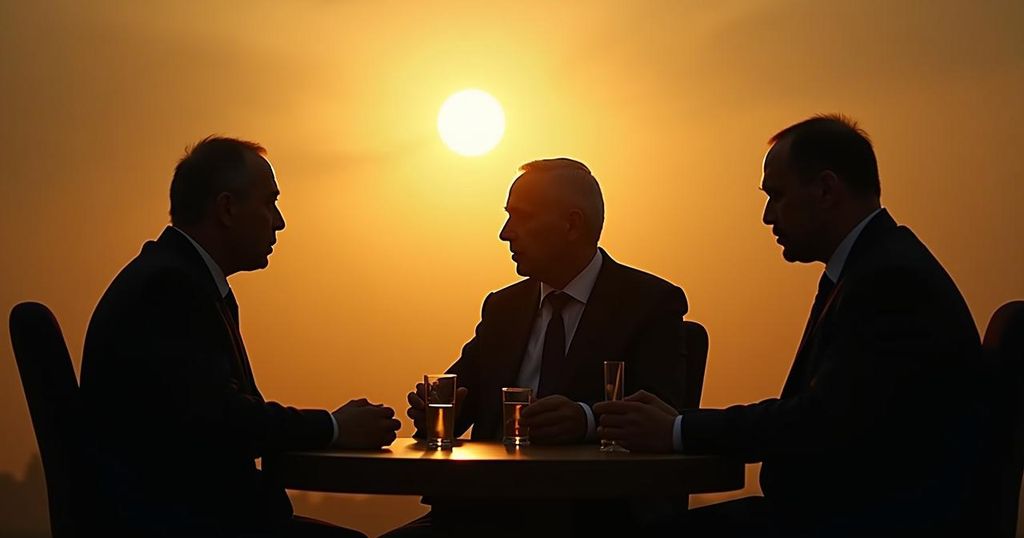Netanyahu Addresses UN, Emphasizes Commitment to Combat Hezbollah and Hamas

Israeli Prime Minister Benjamin Netanyahu, in his UN General Assembly speech, reaffirmed Israel’s commitment to “continue degrading Hezbollah” until objectives are achieved amid ongoing conflicts with both Hezbollah and Hamas. His remarks drew significant protest from global leaders condemning the violence in the Middle East, highlighting the contentious atmosphere surrounding Israel’s military actions and the international calls for cease-fires. The speech underlined Israel’s security concerns while addressing the regional implications of its ongoing strife with neighboring forces.
During his address at the United Nations General Assembly, Israeli Prime Minister Benjamin Netanyahu stated his commitment to “continue degrading Hezbollah” in the ongoing conflict along Israel’s northern border until all desired objectives are achieved. Netanyahu, who noted he had not planned to attend this year’s session, responded to what he termed lies against his nation. His remarks elicited strong reactions, as leaders from nations including Slovenia and Pakistan condemned the violence escalating in the region. Netanyahu faced mounting internal pressure due to the intensifying conflict with Hezbollah amid ongoing military actions which have reportedly resulted in significant casualties, prompting him to prioritize Israel’s military objectives. Following his address, blasts were reported in Beirut, correlating with Israeli airstrikes against Hezbollah targets, suggesting that the situation remains volatile. Netanyahu defended Israel’s military operations, arguing that the nation has the right to protect its citizens and highlighted Iran’s role as a destabilizing influence in the region. His declaration of pursuing “total victory” in both the Gaza Strip and Lebanon comes in the context of resilient international mediation efforts, seeking to establish a cease-fire amidst escalating tensions. The audience’s reactions during Netanyahu’s address underlined the division on the topic, as many delegates walked out in protest and others vocally opposed his positions. Despite the scrutiny, Netanyahu reinforced his stance by emphasizing that the conflict with Hamas and Hezbollah would persist until there is a complete cessation of threats against Israel. The prime minister also expressed hope for future relations with Saudi Arabia, though such aspirations are clouded by the ongoing violence involving the Palestinian territories. The international community continues to grapple with the complex dynamics of Israeli-Lebanese relations, indicating that the stabilization of the Middle East remains precarious as long as hostilities persist.
The address to the United Nations General Assembly marked a significant moment for Israeli Prime Minister Benjamin Netanyahu, as it reflected the escalating conflicts involving Israel, Hezbollah, and Hamas. This gathering serves as a global platform where world leaders address pressing international issues, making Netanyahu’s remarks about Israel’s military objectives particularly notable in light of the recent increases in violence. Recently, clashes on the Israel-Lebanon border have escalated, leading to fears of wider regional conflict. The ongoing warfare in Gaza adds another layer of complexity to these tensions, as international efforts for mediation have continued to stall. Netanyahu’s assertions and the reactions to them illustrate the contentious nature of global discourse concerning Israel’s military tactics, particularly in light of significant casualties and humanitarian crises. The longstanding enmity between Israel and Hezbollah, coupled with the ongoing strife related to Hamas, reinforces a deeply entrenched conflict that international leaders are seeking to manage amidst calls for cease-fires.
In conclusion, Prime Minister Netanyahu’s speech at the United Nations General Assembly reflects Israel’s unwavering resolve to confront threats from Hezbollah and Hamas while navigating increasing international scrutiny and criticism. His call for “total victory” encapsulates a hardline stance amid escalating violence that has claimed numerous lives on both sides. The session illustrated the complex geopolitical dynamics including the interplay of regional actors and competing narratives surrounding the Israel-Palestinian conflict. As the international community watches closely, the situation remains precarious, firmly underscoring the need for diplomatic interventions that can bring about an enduring resolution.
Original Source: apnews.com








